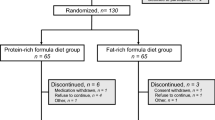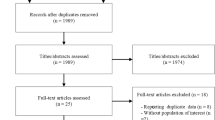Abstract
Background:
Achieving significant weight loss and glycemic control in diabetic patients remains a challenging task.
Objective:
This study compared the effects of a soy-based meal replacement (MR) plan vs an individualized diet plan (IDP; as recommended by the American Diabetes Association) on weight loss and metabolic profile.
Design/Subjects:
A total of 104 subjects were randomized prospectively to the two treatments for a total of 12 months.
Results:
In all, 77 of the 104 subjects completed the study. Percentage weight loss in MR group (4.57±0.81%) was significantly greater (P<0.05) than in IDP group (2.25±0.72%). Fasting plasma glucose was significantly reduced in MR group (126.4±4.9 mg/dl) compared with IDP group (152.5±6.6 mg/dl, P<0.0001) at 6 months but not at 12 months. Controlling for baseline levels, hemoglobin Alc level improved by 0.49±0.22% for those receiving MR when compared to IDP group (P<0.05). A greater number of subjects in MR group reduced their use of sulfonylureas (P<0.0001) and metformin (P<0.05) as compared to IDP group. High-sensitivity C-reactive protein (hs-CRP) decreased −26.3% (P=0.019) in MR group compared to −7.06% (P=0.338) in IDP group at 6 months. Similar changes were observed at 12 months with MR groups, with hs-CRP decreasing by −25.0% (P=0.019) compared to −18.7% (P=0.179) in IDP group.
Conclusion:
This study demonstrates that MR is a viable strategy for weight reduction in diabetic patients, resulting in beneficial changes in measures of glycemic control and reduction of medications.
This is a preview of subscription content, access via your institution
Access options
Subscribe to this journal
Receive 12 print issues and online access
$259.00 per year
only $21.58 per issue
Buy this article
- Purchase on Springer Link
- Instant access to full article PDF
Prices may be subject to local taxes which are calculated during checkout




Similar content being viewed by others
References
Agurs-Collins TD, Kumanyika SK, Ten Have TR & Adams-Campbell LL (1997): A randomized controlled trial of weight reduction and exercise for diabetes management in older African-American subjects. Diabetes Care 20, 1503–1511.
Allison DB, Gadbury G, Schwartz LG, Murugesan R, Kraker JL, Heshka S, Fontaine KR & Heymsfield SB (2003): A novel soy-based meal replacement formula for weight loss among obese individuals: a randomized controlled clinical trial. Eur. J Clin. Nutr. 57, 514–522.
Anderson JW, Johnstone BM & Cook-Newell ME (1995): Meta-analysis of the effects of soy protein intake on serum lipids. N. Engl. J. Med. 333, 276–282.
Chan JM, Rimm EB, Colditz GA, Stampfer MJ & Willett WC (1994): Obesity, fat distribution, and weight gain as risk factors for clinical diabetes in men. Diabetes Care 17, 961–969.
Clinical Practice Recommendations (1997): Diabetes Care 20, S1–S70.
Colditz GA, Willett WC, Stampfer MJ, Manson JE, Hennekens CH, Arky RA & Speizer FE (1990): Weight as a risk factor for clinical diabetes in women. Am. J Epidemiol. 132, 501–513.
Davidson MH, Hauptman J, DiGirolamo M, Foreyt JP, Halsted CH, Heber D, Heimburger DC, Lucas CP, Robbins DC, Chung J & Heymsfield SB (1999): Weight control and risk factor reduction in obese subjects treated for 2 years with orlistat: a randomized controlled trial. JAMA 281, 235–242.
Ditschuneit HH, Flechtner-Mors M, Johnson TD & Adler G (1999): Metabolic and weight-loss effects of a long-term dietary intervention in obese patients. Am. J Clin. Nutr. 69, 198–204.
Flegal KM, Carroll MD, Kuczmarski RJ & Johnson CL (1998): Overweight and obesity in the United States: prevalence and trends, 1960-1994. Int. J Obes. Relat Metab Disord. 22, 39–47.
Flechtner-Mors M, Ditschuneit HH, Johnson TD, Suchard MA & Adler G (2000): Metabolic and weight loss effects of long-term dietary intervention in obese patients: four-year results. Obes. Res. 8, 399–402.
Ford ES, Williamson DF & Liu S (1997): Weight change and diabetes incidence: findings from a national cohort of US adults. Am. J Epidemiol. 146, 214–222.
Friedewald WT, Levy RI & Fredrickson DS (1972): Estimation of the concentration of low-density lipoprotein cholesterol in plasma, without use of the preparative ultracentrifuge. Clin. Chem. 18, 499–502.
Goldstein DJ (1992): Beneficial health effects of modest weight loss. Int. J Obes. Relat. Metab. Disord. 16, 397–415.
Heber D, Ashley JM, Wang HJ & Elashoff RM (1994): Clinical evaluation of a minimal intervention meal replacement regimen for weight reduction. J Am. Coll. Nutr. 13, 608–614.
Heller SR, Clarke P, Daly H, Davis I, McCulloch DK, Allison SP & Tattersall RB (1988): Group education for obese patients with type 2 diabetes: greater success at less cost. Diabet. Med. 5, 552–556.
Hermansen K, Sondergaard M, Hoie L, Carstensen M & Brock B (2001): Beneficial effects of a soy-based dietary supplement on lipid levels and cardiovascular risk markers in type 2 diabetic subjects. Diabetes Care 24, 228–233.
Hollander PA, Elbein SC, Hirsch IB, Kelley D, McGill J, Taylor T, Weiss SR, Crockett SE, Kaplan RA, Comstock J, Lucas CP, Lodewick PA, Canovatchel W, Chung J & Hauptman J (1998): Role of orlistat in the treatment of obese patients with type II diabetes. A 1-year randomized double-blind study. Diabetes Care 21, 1288–1294.
Maggio CA & Pi-Sunyer FX (1997): The prevention and treatment of obesity. Application to type 2 diabetes. Diabetes Care 20, 1744–1766.
Mendall MA, Patel P, Ballam L, Strachan D & Northfield TC (1996): C reactive protein and its relation to cardiovascular risk factors: a population based cross sectional study. BMJ 312, 1061–1065.
Mojiminiyi OA, Abdella N, Moussa MA, Akanji AO, Al Mohammedi H & Zaki M (2002): Association of C-reactive protein with coronary heart disease risk factors in patients with type 2 diabetes mellitus. Diabetes Res. Clin. Pract. 58, 37–44.
National Institute of Health Publication (1995): National Diabetes Data Group. Diabetes in America pp. 95–1469. Appendix 7.11.
National Institute of Health Publication (1998): Clinical guidelines on the identification, evaluation, and treatment of overweight and obesity in adults: The evidence report. Obes. Res. 6 (Suppl), 51S–209.
The Diabetes Prevention Program (1999): The Diabetes Prevention Program design and methods for a clinical trial in the prevention of type 2 diabetes. Diabetes Care 22, 623–634.
Williamson DF, Thompson TJ, Thun M, Flanders D, Pamuk E & Byers T (2000): Intentional weight loss and mortality among overweight individuals with diabetes. Diabetes Care 23, 1499–1504.
Wing RR, Koeske R, Epstein LH, Nowalk MP, Gooding W & Becker D (1987): Long-term effects of modest weight loss in type II diabetic patients. Arch. Intern. Med 147, 1749–1753.
Yip I, Go VL, DeShields S, Saltsman P, Bellman M, Thames G, Murray S, Wang HJ, Elashoff R & Heber D (2001): Liquid meal replacements and glycemic control in obese type 2 diabetes patients. Obes. Res. 9 (Suppl 4), 341S–347S.
Author information
Authors and Affiliations
Corresponding author
Additional information
Guarantor: Z Li.
Contributors: ZL and KH—manuscript preparation and data analysis. PS, MB and GT—data collection and patient evaluation. SD, H-JW and RE—statistical analysis. YL—data collection and processing. DH—principle investigator, manuscript preparation and data analysis.
Rights and permissions
About this article
Cite this article
Li, Z., Hong, K., Saltsman, P. et al. Long-term efficacy of soy-based meal replacements vs an individualized diet plan in obese type II DM patients: relative effects on weight loss, metabolic parameters, and C-reactive protein. Eur J Clin Nutr 59, 411–418 (2005). https://doi.org/10.1038/sj.ejcn.1602089
Received:
Revised:
Accepted:
Published:
Issue Date:
DOI: https://doi.org/10.1038/sj.ejcn.1602089
Keywords
This article is cited by
-
Effects of nutritional supplementation on glucose metabolism and insulin function among people with HIV initiating ART
BMC Nutrition (2021)
-
Clinical and metabolic response to soy administration in older women with metabolic syndrome: a randomized controlled trial
Diabetology & Metabolic Syndrome (2019)
-
The safety and efficacy of a low-energy diet to induce weight loss, improve metabolic health, and induce diabetes remission in insulin-treated obese men with type 2 diabetes: a pilot RCT
International Journal of Diabetes in Developing Countries (2019)
-
Formuladiäten zum Abnehmen bei Typ-2-Diabetes – sinnvolle Strategie oder verzichtbar?
Der Diabetologe (2017)
-
Soybean bio-refinery platform: enzymatic process for production of soy protein concentrate, soy protein isolate and fermentable sugar syrup
Bioprocess and Biosystems Engineering (2016)



